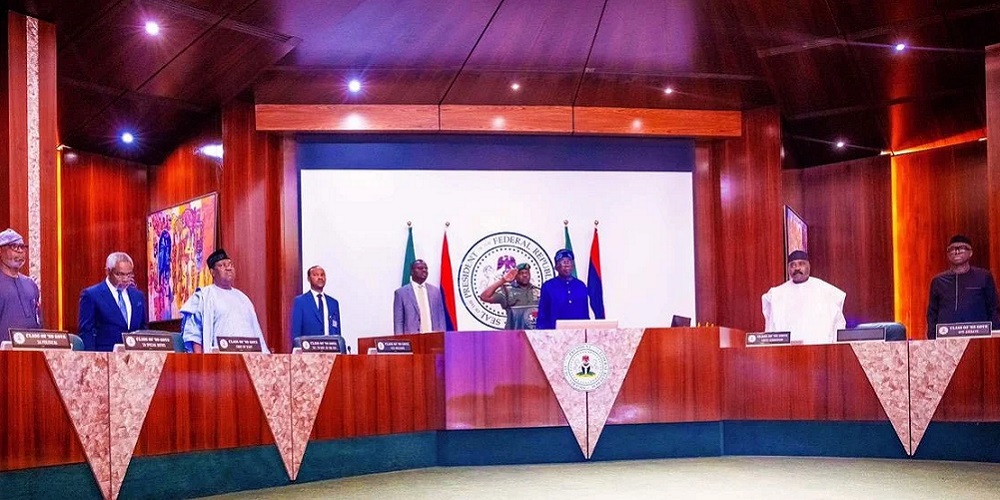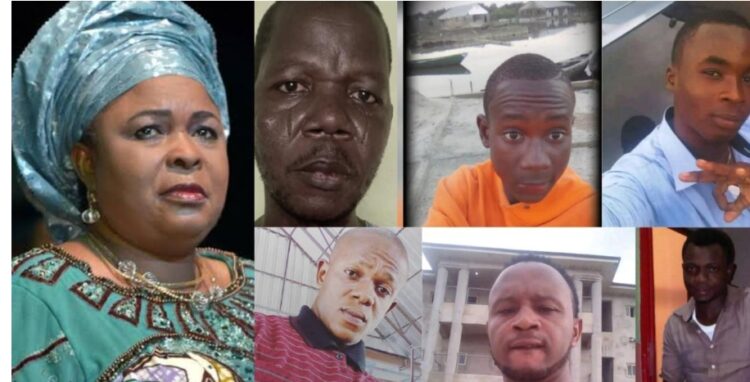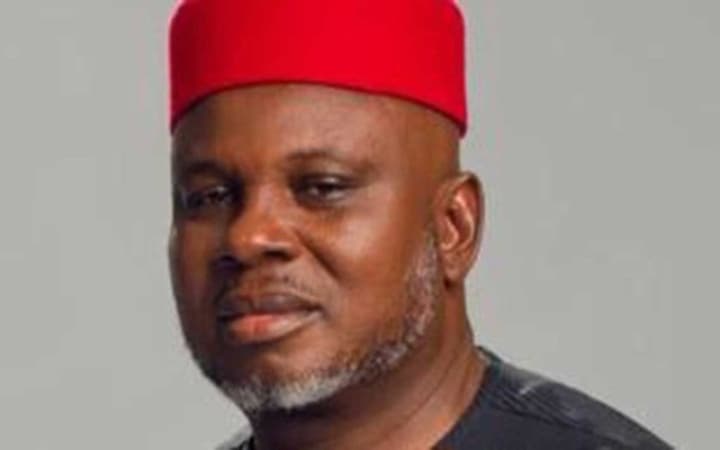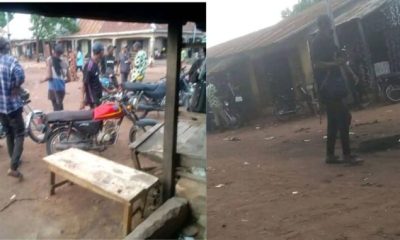News
FEC Approves N4.2trn for Lagos-Calabar Coastal Road, Other Major Road Projects Nationwide

The federal government has approved road infrastructure contracts worth N4.2 trillion, covering major highways and bridges across Nigeria, including the second phase of the Lagos-Calabar Coastal Road. Minister of Works, Senator David Umahi, disclosed this to newsmen yesterday in Abuja at the end of the Federal Executive Council (FEC) meeting presided by President Bola Tinubu.
According to Umahi, the projects are spread over several states, with a focus on enhancing connectivity, improving road safety, and supporting economic growth.
FEC also approved road construction projects worth N159.5 billion for the Federal Capital Territory (FCT), targeting infrastructure development within the city and its satellite towns.
Minister of State for the FCT, Mariya Mahmoud Bunkure, disclosed the approvals during the post-FEC media briefing, where she detailed the major projects aimed at improving accessibility and urban development.
The federal government equally unveiled an ambitious plan to position the country’s creative and tourism sectors as key drivers of economic growth, with the potential to contribute at least $100 billion to the nation’s Gross Domestic Product (GDP) and creating two million jobs. Minister of Art, Culture, Tourism, and Creative Economy, Hannatu Musawa, made this known to newsmen yesterday after the FEC meeting.
The contracts for the nationwide road infrastructure included new constructions, rehabilitation of deteriorating sections, and expansion of critical routes, with many projects shifting towards concrete pavement for durability.
The largest allocation went to the Lagos-Calabar Coastal Highway, with FEC approving N1.334 trillion for the construction of a 130-kilometre dual carriageway. This covers 65 kilometres in Lagos and Ogun states, and an additional stretch starting from Calabar through Akwa Ibom.
The project will be executed under an Engineering, Procurement, and Construction (EPC) framework, with a 10-year maintenance plan.
FEC also approved N470.9 billion for the Delta State access road and N148 billion for the Anambra State access road to the Second Niger Bridge.
According to the minister, both roads will be constructed using concrete to ensure long-term resilience.
He explained, “Lagos-Ibadan Expressway (Phase 2, Section 1) got N195 billion approval to undergo reconstruction under the Presidential Infrastructure Development Fund (PIDF), focusing on improving traffic flow and reducing congestion along the busy corridor.
“The Abuja-Kano road project, previously handled by Julius Berger, has been restructured into two lots following contract termination, including Lot 1 (FCT-Niger boundary): Expanded by 5.71 kilometres towards Kogi State and Lot 3 (Kano section): extended by 17 kilometres.”
Umahi said the total length of the project was now 118 kilometres, with solar street lighting planned throughout. Section 1 will be built with concrete, while Section 3 will use asphalt.
The reconstruction of three sections of the Lokoja-Benin road will be done entirely with concrete for durability at N305 billion, including Obajana to Benin (Section I): N64 billion; Auchi to Edo (Section II): N110 billion; and Benin Airport area (Section III): N131 billion.
A contract worth N3.571 billion was approved for an extensive structural assessment of the Third Mainland Bridge and Carter Bridge in Lagos. Umahi said this evaluation aimed to prevent further deterioration, building on findings from assessments conducted in 2009 and 2013, which identified progressive structural decay.
FEC also approved Ado-Ekiti–Igede Road Project (N5.4 billion) as part of a series of smaller road upgrades in Ekiti State to improve local connectivity and reduce travel time.
It approved N22 billion for the Onitsha-Owerri Expressway. The minister said the expressway will undergo rehabilitation to ease movement between Anambra and Imo states, and foster trade within the South-east region.
Musasa-Jos Route (Kaduna State) was approved at N18 billion to enhance road safety and reduce travel time between Kaduna and Plateau states.
Abia and Enugu States Road Project got N12.75 billion in a joint project that will focus on key sections within the budget limits, and address long-standing infrastructure gaps.
Umahi emphasised that most new projects, including the Lokoja-Benin and Abuja-Kano roads, will be constructed using reinforced concrete pavement instead of traditional asphalt.
He said, “Concrete roads are not only more durable but also cost-effective in the long run. In fact, the cost of these concrete projects is significantly cheaper than previous asphalt-based contracts rejected by some contractors.”
The minister addressed concerns about terminated contracts, particularly with Julius Berger, clarifying that the government has negotiated cost-saving measures while equipment from previous contractors will be repurposed to avoid unnecessary mobilisation costs.
Umahi also dismissed recent reports about fake companies being awarded contracts, and assured Nigerians that due diligence was followed in selecting credible contractors.
According to him, “We’ve resolved misunderstandings with key stakeholders, including media organisations, to ensure transparency. The companies handling these projects are legitimate and well-equipped.
“This is not just about roads; it’s about driving Nigeria’s economic transformation. We are committed to delivering durable, cost-effective infrastructure that will stand the test of time.”
FEC also approved road projects worth N159.5 billion for the FCT, focussing on infrastructure development within Abuja and its satellite towns.
The FCT minister of state detailed the five major projects aimed at improving accessibility and urban development during the post-FEC media briefing.
She said the projects included Bus Terminal Access Road, Mabushi, awarded to Messrs SETRACO Nigeria Limited at the cost of N30.97 billion, with a completion period of 18 months.
The council approved Arterial Road from Wuye District to Ring Road II, awarded to Messrs Arab Contractors Nigeria Limited at the cost of N62.5 billion, with a completion period of 20 months.
Bunkure stated, “Also approved is Kuje-Gwagwalada Dual Carriageway Construction to Messrs Gilmor Engineering Nigeria Limited at N7.49 billion; the rehabilitation of Old Keffi Road (Kado Village to Dei Dei), awarded to
Messrs Lubric Construction Company Limited at N26.87 billion, with a completion time of 18 months.
“There is also a contract for the construction of access road to Renewed Hope Cities and Estates (Kasana West District) to Messrs Lubric Construction Nigeria Limited in the sum of N31.66 billion, with a completion time of 18 months.”
The minister emphasised that the projects aligned with the FCT administration’s commitment to urban expansion, improved road networks, and enhanced connectivity across Abuja.
She said the contracts were awarded to reputable construction firms with track records of delivering quality infrastructure projects.
Bunkure assured residents that the projects would be completed within the stipulated timelines to enhance mobility and economic development in the capital city.
Equally on Monday, the federal government unveiled a plan to position Nigeria’s creative and tourism sectors as key drivers of economic growth, with the potential to contribute at least $100 billion to GDP and create over two million jobs.
The art, culture, tourism, and creative economy minister told the post-FEC media briefing that at the heart of the plan was the establishment of Creative and Tourism Infrastructure Corporation (CTIC), a special-purpose vehicle designed to invest in and develop critical infrastructure for Nigeria’s creative and tourism industries.
The initiative, approved by the FEC, will operate under a public-private partnership (PPP) framework, and attract both local and international investors to support its ambitious goals.
“The CTIC is not just a project; it’s a transformative agenda,” Musawa stated.
“We aim to unlock the immense potential of Nigeria’s creative and tourism industries, enhance economic growth, and project Nigeria’s cultural soft power globally,” she added.
The minister outlined the government’s targets for the CTIC to include: contributing at least $100 billion to Nigeria’s GDP; creating over two million jobs, with a focus on Nigeria’s vibrant youth population; and developing world-class infrastructure to support talent development, cultural preservation, and tourism growth
“This is a deliberate strategy by President Bola Tinubu’s administration to diversify the economy beyond oil and tap into Nigeria’s vast creative and cultural wealth,” Musawa said.
The minister emphasised that while Nigeria boasted a wealth of creative talent and cultural heritage, lack of supporting infrastructure had been a major barrier to full realisation of the sector’s economic potential.
Musawa said, “Everyone talks about Nigeria’s creativity. Our content is globally celebrated, from Nollywood to Afrobeat. But what we lack is the infrastructure to support and sustain this growth.”
She stressed, “Imagine the impact if events, like December’s ‘Detty December’ in Lagos, were backed by world-class infrastructure. The value would be exponential.”
Musawa revealed an array of projects under consideration to drive the sector’s growth, including: Abuja Resort Range and Abuja Creative City; revitalisation of Yankari Game Reserve; development of 5,000 new cinema screens nationwide; Wole Soyinka Centre for African Arts in Lagos; and a National Digital Distribution Network for creative content.
Others were upgrading the National Gallery of Art and expanding the National Arena to 100,000-seat capacity; establishment of a Nigerian National Museum in Abuja; positioning Nollywood as a global film destination with dedicated production hubs; and a world-class music arena to support Nigeria’s booming music industry.
“It’s unthinkable that Nigeria, the Giant of Africa, doesn’t have a national museum in its capital city. We’re going to change that,” Musawa declared.
She also highlighted ongoing engagements with development partners and stakeholders worldwide to secure investments and adopt innovative financing models for the CTIC projects.
Musawa explained, “The government is intentional about this. We’re not just waiting for foreign investments; we’re putting domestic financing structures in place and creating an environment where the private sector can thrive.
“Today marks the beginning of a journey to not just build infrastructure, but to shift the national mind-set about the economic power of culture, creativity, and tourism.”
The minister added, “This is a new dawn for Nigeria’s creative and tourism industries.”
News
Court Orders Fast-Tracked Trial Of 15 Workers Held In Prison For 6 Yrs Over Patience Jonathan’s Missing Jewellery

The Bayelsa State High Court has ordered a fast-tracked trial for 15 domestic workers who have spent nearly six years in detention at the Okaka Correctional Centre, Yenagoa, without conviction, over missing jewellery belonging to former First Lady Patience Jonathan.
SaharaReporters gathered that the order came after the prosecution and defence teams reached a rare consensus during Thursday’s proceedings to fast-track the case, which has suffered deliberate and serial delays allegedly masterminded by Patience Jonathan’s private legal team.
“The court proceeded well today, and both parties have agreed to finish the case as soon as possible, with an accelerated hearing. So victory is coming,” a source close to the defence told SaharaReporters.
The 15 accused persons, most of whom were part of Mrs Jonathan’s domestic staff, were arrested in 2019 and have remained in detention without bail, with the case dragging on endlessly for years amid reports of consistent manipulation of court processes.
A previous report by SaharaReporters exposed a pattern of intentional court delays reportedly orchestrated by Mrs Jonathan’s private prosecutors, Ige Asemudara and Samuel Chinedu Maduba, both of whom have been consistently representing the former First Lady since 2019.
“The prosecutors are Ige Asemudara and Samuel Chinedu Maduba,” one of the sources confirmed.
“One of them comes from Lagos while the second travels in from Port Harcourt. They’ve been handling this case from day one, presenting witnesses who come to tell lies. One witness took almost two years,” a source earlier told SaharaReporters.
Sources alleged that Mrs Jonathan gave direct instructions to delay the proceedings.
“The aim is to frustrate the process and keep these innocent people in prison as long as possible. It’s an abuse of the legal system,” a source close to the courtroom told SaharaReporters.
The delay tactics reportedly included health excuses, unreachable witnesses, and repeated adjournments based on flimsy reasons. “Sometimes, Ige Asemudara would claim he is sick or his witness has work. Other times, he just asks for long adjournments,” said another insider.
Shockingly, the judiciary itself was not spared from complicity allegations. A source revealed that the presiding judge initially delayed hearing the bail applications, claiming she wanted to listen to some of the prosecution’s evidence first to determine the nature of the charges.
“When the case started in 2019, they all applied for bail,” the source said. “But the judge told their lawyers to wait so she could hear some evidence. After that, she shockingly denied bail, saying the offences were capital and therefore not bailable.”
Meanwhile, the Bayelsa State High Court has denied any involvement in the delays, recently restating its commitment to speedy justice and dismissing reports of suspects’ trials being delayed.
The court, in a reaction to reports that alleged that the trial of 15 domestic workers facing trial for burglary and theft of jewellery, was being delayed, said the claim was false.
It claimed that, according to available records, the matter had suffered delays due to multiple defence lawyers who must cross-examine witnesses, which had slowed down proceedings. It added that the case had also suffered several adjournments at the instance of counsel.
The delays have left the defence team and families of the detainees stunned, particularly since the prosecution reportedly failed to produce any convincing evidence to support the capital charges.
The affected persons are Williams Alami, Vincent Olabiyi, Ebuka Cosmos, John Dashe, Tamunokuro Abaku, Sahabi Lima, Emmanuel Aginwa, Erema Deborah, Precious Kingsley, Tamunosiki Achese, Salomi Wareboka, Sunday Reginald, Boma Oba, Vivian Golden and Emeka Benson.
They have remained behind bars without justice, caught in the web of power, influence, and a compromised legal process.
With the court finally conceding to an accelerated hearing, hope has once again sparked for the victims of this legal nightmare.
News
Catholic Church gives Anambra APC guber candidate rigid conditions for support

Barely 10 days after he emerged as the All Progressives Congress (APC) gubernatorial standard bearer for the November 8 gubernatorial poll in Anambra State, Prince Nicholas Chukwujekwu Ukachukwu has been given rigid conditions to receive the support of the Catholic Church in the state.
Sources told The Guardian that the basic conditions set before the APC governorship candidate include the selection of a deputy from the Catholic fold, and also that 60 per cent of his cabinet must be Catholics.
This is just as the APC governorship hopeful has been inundated by lobbyists for the position of running mate, even as he engaged with concerned APC stakeholders in the state in a bid to find common ground with various women groups agitating for gender parity.
The Guardian learned that the race for Ukachukwu’s running mate had been narrowed down between two former female Senators, Dr. Uche Lilian Ekwunife and Dr. Margery Okadigbo, who hail from the Central and North Senatorial Districts of the state, respectively.
Although both female politicians are Catholics, the factor of zoning is said to be impacting their chances, because while the more politically active Ekwunife hails from the populous Anambra Central District, Mrs. Okadigbo is from Anambra North, which has just served out eight years of governorship through Willie Obiano.
Also, the fact of her maiden community, Igboukwu in Aguata Local Council, and influence as the current Director General of South East Governors’ Forum is ticking in Ekwunife’s favour, as her candidacy is expected to help slice the votes in Old Aguata Union from where the incumbent Governor Chukwuma Soludo hails. (The Guardian)
News
NJC investigates 18 Imo judges over suspected age falsification

The National Judicial Council has launched a probe into 18 judges in the Imo State judiciary over allegations of age falsification, in a development raising fresh concerns about integrity and transparency within Nigeria’s judicial system.
The NJC, in a statement on Thursday by its Deputy Director of Information, Kemi Ogedengbe, confirmed that the allegations were being treated with utmost seriousness and were currently under review.
“Allegations of this nature require detailed investigation before any action can be taken,” Ogedengbe stated.
“The NJC is investigating the allegations and may take a decision by the end of the month. For now, we cannot act without completing our inquiries. The council will convene and make decisions on the matter.”
The investigation follows a petition submitted by a civil society group, Civil Society Engagement Platform, which described the matter as an “unprecedented breach of judicial integrity.”
The group alleged that the judges deliberately manipulated their birth records to either prolong their tenure or gain appointments within the judiciary.
In a letter addressed to the NJC Chairman and Chief Justice of Nigeria, Justice Kudirat Kekere-Ekun, the platform cited discrepancies in the judges’ official documents, including Law School registration forms, Department of State Services reports, and Nominal Rolls.
The petition, signed by CSEP’s Director of Investigation, Comrade Ndubuisi Onyemaechi, included what it described as compelling documentary evidence marked as Exhibits 001 to 018.
Among those named in the petition is Justice I. O. Agugua, who reportedly has two different birth dates—May 10, 1959, and May 10, 1960—and is also facing separate allegations of misconduct.
Justice C. A. Ononeze-Madu is alleged to have birth records stating both July 7, 1963, and July 7, 1965, while Justice M. E. Nwagbaoso is accused of presenting conflicting dates of birth—August 20, 1952, and August 20, 1962.
The remaining 15 judges also reportedly have varying inconsistencies in their personal data, a revelation that has intensified public scrutiny of the judiciary’s accountability mechanisms.
The NJC, which is constitutionally empowered to discipline judicial officers, is expected to reconvene soon to deliberate on the findings of its inquiry and take appropriate disciplinary actions where necessary.
The unfolding development comes amid mounting calls for institutional reforms to restore public trust in the judiciary and reinforce ethical standards across all arms of government.
-

 News22 hours ago
News22 hours agoBREAKING: Unknown gunmen reportedly storm Senator Natasha’s family residence
-

 News24 hours ago
News24 hours agoSAD! Again, Alleged Herdsmen Attack Three Benue Communities
-

 News16 hours ago
News16 hours agoAbuja light rail project must be commissioned on May 29-Wike vows
-

 News21 hours ago
News21 hours agoLawmaker Slams NBA Over Rivers Crisis, Demands Return of N300m
-

 Politics24 hours ago
Politics24 hours agoPDP govs are jokers, can’t stop coalition train, Atiku boasts
-

 News7 hours ago
News7 hours agoTinubu Remains Engaged In Governance From Europe, Will Return After Easter – Presidency
-

 News17 hours ago
News17 hours agoJust in: Alleged Herdsmen Armed With AK-47 Rifles Take Over Communities In Benue State
-

 News20 hours ago
News20 hours agoFinally , Lagos Court frees Quadri, young Nigerian who stood before Obi’s convoy in viral photo


















